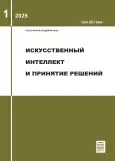О свойствах предельного множества процесса многократного машинного обучения при преобразованиях признакового пространства
- Авторы: Веприков А.С.1,2, Хританков А.С.1,2
-
Учреждения:
- Московский физико-технический институт (национальный исследовательский университет)
- Институт проблем передачи информации им. А. А. Харкевича Российской академии наук
- Выпуск: № 1 (2025)
- Страницы: 56-66
- Раздел: Машинное обучение, нейронные сети
- URL: https://journal-vniispk.ru/2071-8594/article/view/293493
- DOI: https://doi.org/10.14357/20718594250105
- EDN: https://elibrary.ru/RKXLLY
- ID: 293493
Цитировать
Полный текст
Аннотация
В работе изучено влияние преобразований признакового пространства на свойства процесса многократного машинного обучения. Исследованы условия, при которых прогноз асимптотического поведения системы во времени, полученный в исходном пространстве, может быть перенесен на аналогичную систему в преобразованном пространстве. Полученные результаты указывают на возможность использования более простых систем в пространствах меньшей размерности для изучения процессов в сложных системах.
Об авторах
Андрей Сергеевич Веприков
Московский физико-технический институт (национальный исследовательский университет); Институт проблем передачи информации им. А. А. Харкевича Российской академии наук
Автор, ответственный за переписку.
Email: veprikov.as@phystech.edu
студент кафедры интеллектуального анализа данных, младший научный сотрудник
Россия, Москва; МоскваАнтон Сергеевич Хританков
Московский физико-технический институт (национальный исследовательский университет); Институт проблем передачи информации им. А. А. Харкевича Российской академии наук
Email: anton.khritankov@phystech.edu
кандидат физико-математических наук, доцент, старший научный сотрудник
Россия, Москва; МоскваСписок литературы
- Khritankov A. Hidden Feedback Loops in Machine Learning Systems: A Simulation Model and Preliminary Results // Software Quality: Future Perspectives on Software Engineering Quality. 13th International Conference SWQD 2021. Lecture Notes in Business Information Processing. Springer International Publishing, Cham, 2021. V. 404. P. 54-65.
- Khritankov A. Positive feedback loops lead to concept drift in machine learning systems // Applied Intelligence. 2023. V. 53. No 19. P. 22648-22666.
- Taori R., Hashimoto T. Data feedback loops: Model-driven amplification of dataset biases // Proceedings of the 40 th International Conference on Machine Learning, Honolulu, Hawaii, USA. PMLR 202, 2023. P. 33883-33920.
- Adam G. A. et al. Error amplification when updating deployed machine learning models // Machine Learning for Healthcare Conference. PMLR, 2022. P. 715-740.
- Adam G. A. et al. Hidden risks of machine learning applied to healthcare: unintended feedback loops between models and future data causing model degradation // Machine Learning for Healthcare Conference. PMLR, 2020. P. 710-731.
- Rowland F. The filter bubble: What the internet is hiding from you // Portal: Libraries and the Academy. 2011. V. 11. No 4. P. 1009-1011.
- Davies H. C. Redefining filter bubbles as (escapable) sociotechnical recursion // Sociological Research Online. 2018. V. 23. No 3. P. 637-654.
- Guess A. et al. Avoiding the echo chamber about echo chambers // Knight Foundation. 2018. V. 2. No 1. P. 1-25.
- Terren L., Borge-Bravo R. Echo chambers on social media: A systematic review of the literature // Review of Communication Research. 2021. V. 9.
- Веприков А. С., Афанасьев А. П., Хританков А.С. Математическая модель эффекта обратной связи в системах искусственного интеллекта // Сборник тезисов 21й Всероссийской конференции «Математические методы распознавания образов» (ММРО-21). М: Российская академия наук, 2023. Т. 12. С. 35-37.
- Xie X. et al. METTLE: A metamorphic testing approach to assessing and validating unsupervised machine learning systems // IEEE Transactions on Reliability. 2020. V. 69. No 4. P. 1293-1322.
- Jia M. et al. Testing machine learning classifiers based on compositional metamorphic relations // International Journal of Performability Engineering. 2020. V. 16. No 1. P. 67.
- Якушева С. Ф., Хританков А. С. Систематический обзор методов составления тестовых инвариантов // Программные системы: теория и приложения. 2024. Т. 15. № 2. С. 37–61.
- Tian Y. et al. Deeptest: Automated testing of deep-neuralnetwork-driven autonomous cars // Proceedings of the 40th international conference on software engineering. 2018. P. 303-314.
- Nakajima S., Chen T. Y. Generating biased dataset for metamorphic testing of machine learning programs // In book: Testing Software and Systems. 31st IFIP WG 6.1 International Conference, ICTSS 2019, Paris, France, Proceedings. Springer International Publishing, 2019. P. 56-64.
- Dwarakanath A. et al. Identifying implementation bugs in machine learning based image classifiers using metamorphic testing // Proceedings of the 27th ACM SIGSOFT international symposium on software testing and analysis. 2018. P. 118-128.
- Domingos P. A unified bias-variance decomposition // Proceedings of 17th international conference on machine learning. Morgan Kaufmann Stanford, 2000. P. 231-238.
- Khritankov A. et al. MLDev: Data Science Experiment Automation and Reproducibility Software // International Conference on Data Analytics and Management in Data Intensive Domains. Springer International Publishing, 2021. P. 3-18.
Дополнительные файлы








